Leadership and Management Development: A Report on Managerial Skills
VerifiedAdded on 2020/06/04
|20
|5787
|47
Report
AI Summary
This report delves into the multifaceted aspects of developing effective managers, covering various management styles such as authoritative, participative, free-rein, and affiliative approaches. It highlights the essential leadership characteristics required for organizational success, including communication skills, team orientation, and innovation. The report explores communication processes within organizations, encompassing formal and informal channels, upward, downward, and horizontal communication, as well as verbal and oral communication methods. It also analyzes organizational culture, discussing different types like power, role, and task cultures, with a specific focus on the Travelodge Walthamstow case study. Furthermore, the report evaluates managerial skills within the hotel industry, conducts a SWOT analysis, and prioritizes objectives for manager development. It examines strategies for leading and motivating teams, making managerial decisions, and providing recommendations for improvement. Finally, the report addresses the role of managerial and personal skills in career development, outlining career development needs, current performance, and future needs to produce a development plan.
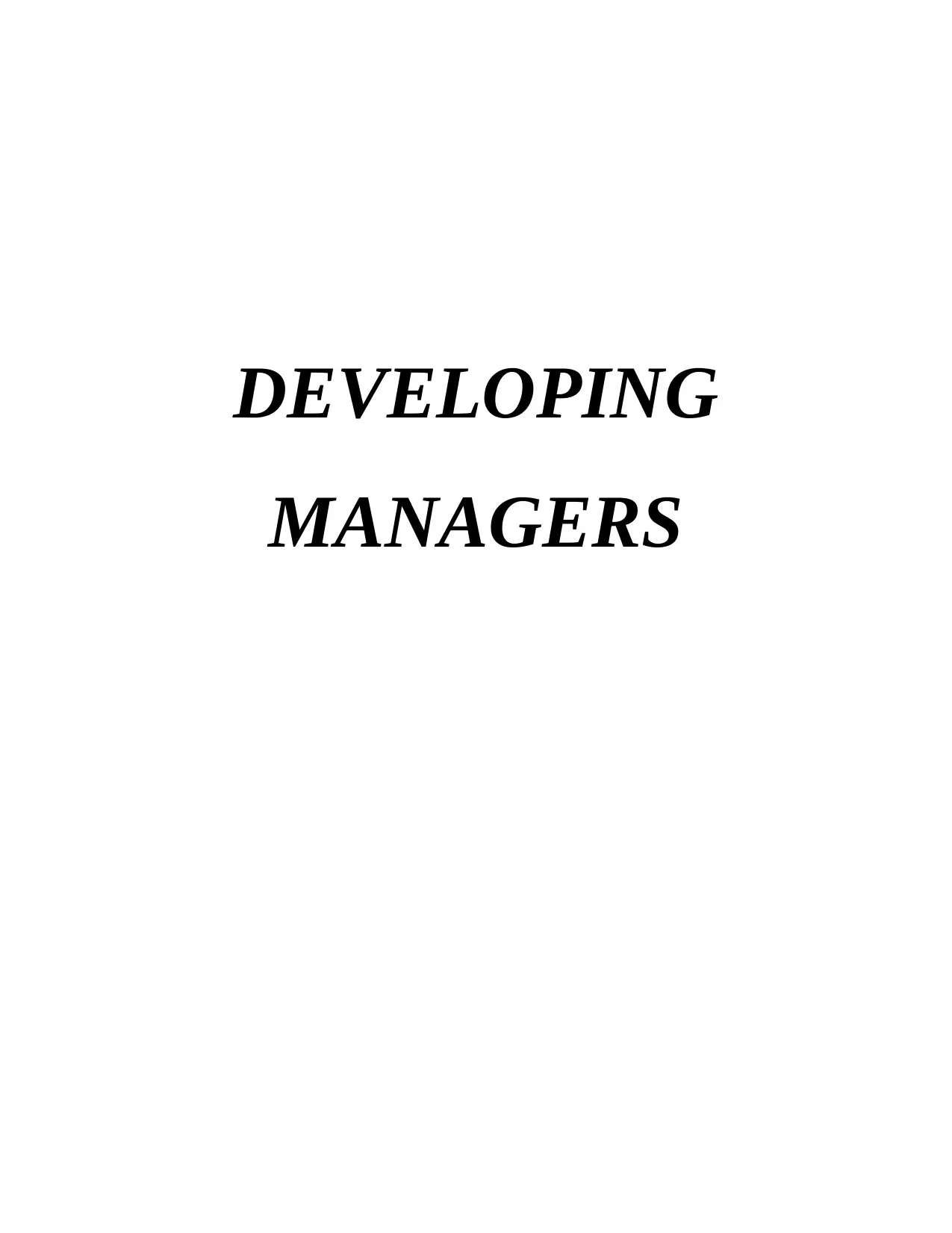
DEVELOPING
MANAGERS
MANAGERS
Paraphrase This Document
Need a fresh take? Get an instant paraphrase of this document with our AI Paraphraser
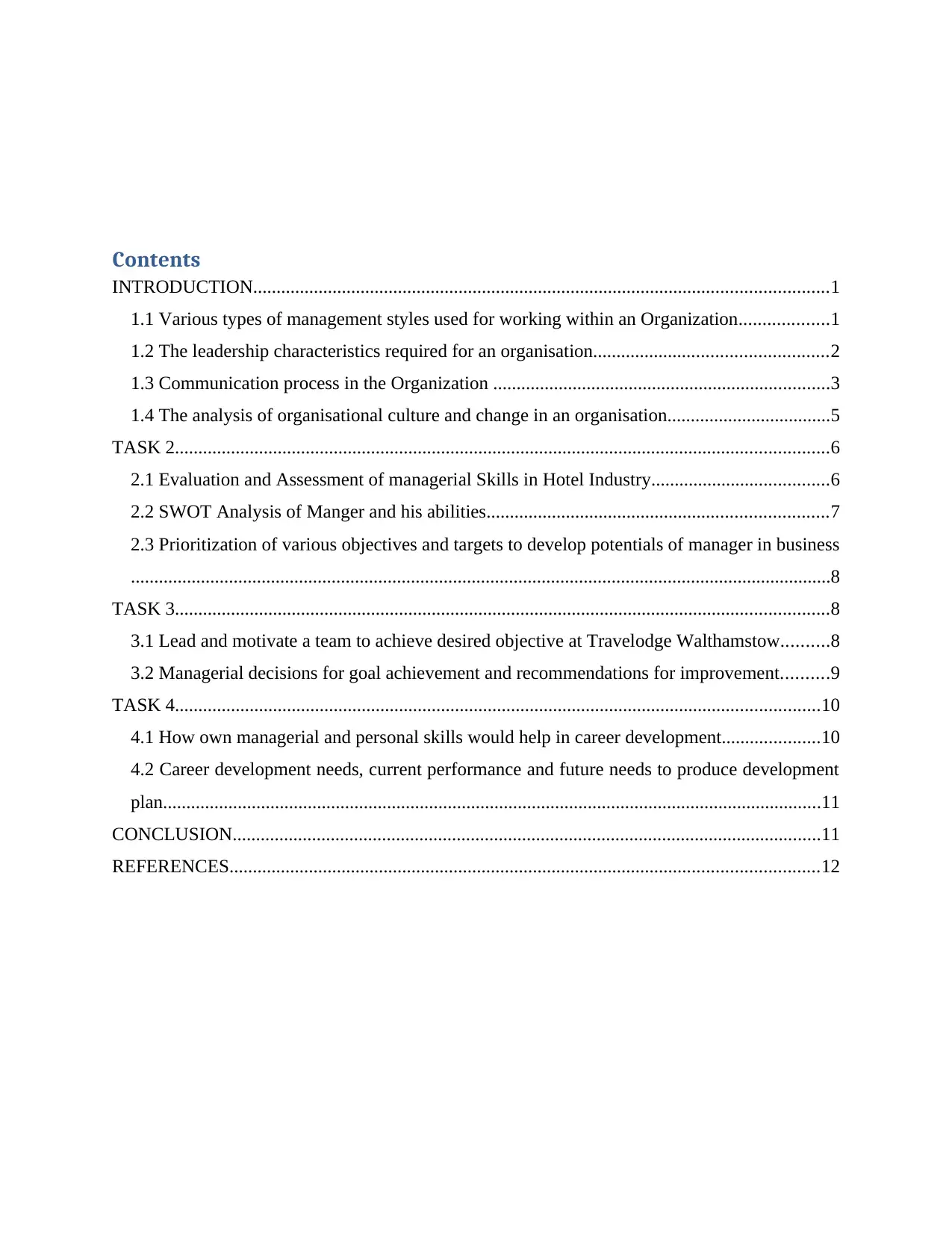
Contents
INTRODUCTION...........................................................................................................................1
1.1 Various types of management styles used for working within an Organization...................1
1.2 The leadership characteristics required for an organisation..................................................2
1.3 Communication process in the Organization ........................................................................3
1.4 The analysis of organisational culture and change in an organisation...................................5
TASK 2............................................................................................................................................6
2.1 Evaluation and Assessment of managerial Skills in Hotel Industry......................................6
2.2 SWOT Analysis of Manger and his abilities.........................................................................7
2.3 Prioritization of various objectives and targets to develop potentials of manager in business
......................................................................................................................................................8
TASK 3............................................................................................................................................8
3.1 Lead and motivate a team to achieve desired objective at Travelodge Walthamstow..........8
3.2 Managerial decisions for goal achievement and recommendations for improvement..........9
TASK 4..........................................................................................................................................10
4.1 How own managerial and personal skills would help in career development.....................10
4.2 Career development needs, current performance and future needs to produce development
plan.............................................................................................................................................11
CONCLUSION..............................................................................................................................11
REFERENCES..............................................................................................................................12
INTRODUCTION...........................................................................................................................1
1.1 Various types of management styles used for working within an Organization...................1
1.2 The leadership characteristics required for an organisation..................................................2
1.3 Communication process in the Organization ........................................................................3
1.4 The analysis of organisational culture and change in an organisation...................................5
TASK 2............................................................................................................................................6
2.1 Evaluation and Assessment of managerial Skills in Hotel Industry......................................6
2.2 SWOT Analysis of Manger and his abilities.........................................................................7
2.3 Prioritization of various objectives and targets to develop potentials of manager in business
......................................................................................................................................................8
TASK 3............................................................................................................................................8
3.1 Lead and motivate a team to achieve desired objective at Travelodge Walthamstow..........8
3.2 Managerial decisions for goal achievement and recommendations for improvement..........9
TASK 4..........................................................................................................................................10
4.1 How own managerial and personal skills would help in career development.....................10
4.2 Career development needs, current performance and future needs to produce development
plan.............................................................................................................................................11
CONCLUSION..............................................................................................................................11
REFERENCES..............................................................................................................................12

⊘ This is a preview!⊘
Do you want full access?
Subscribe today to unlock all pages.

Trusted by 1+ million students worldwide
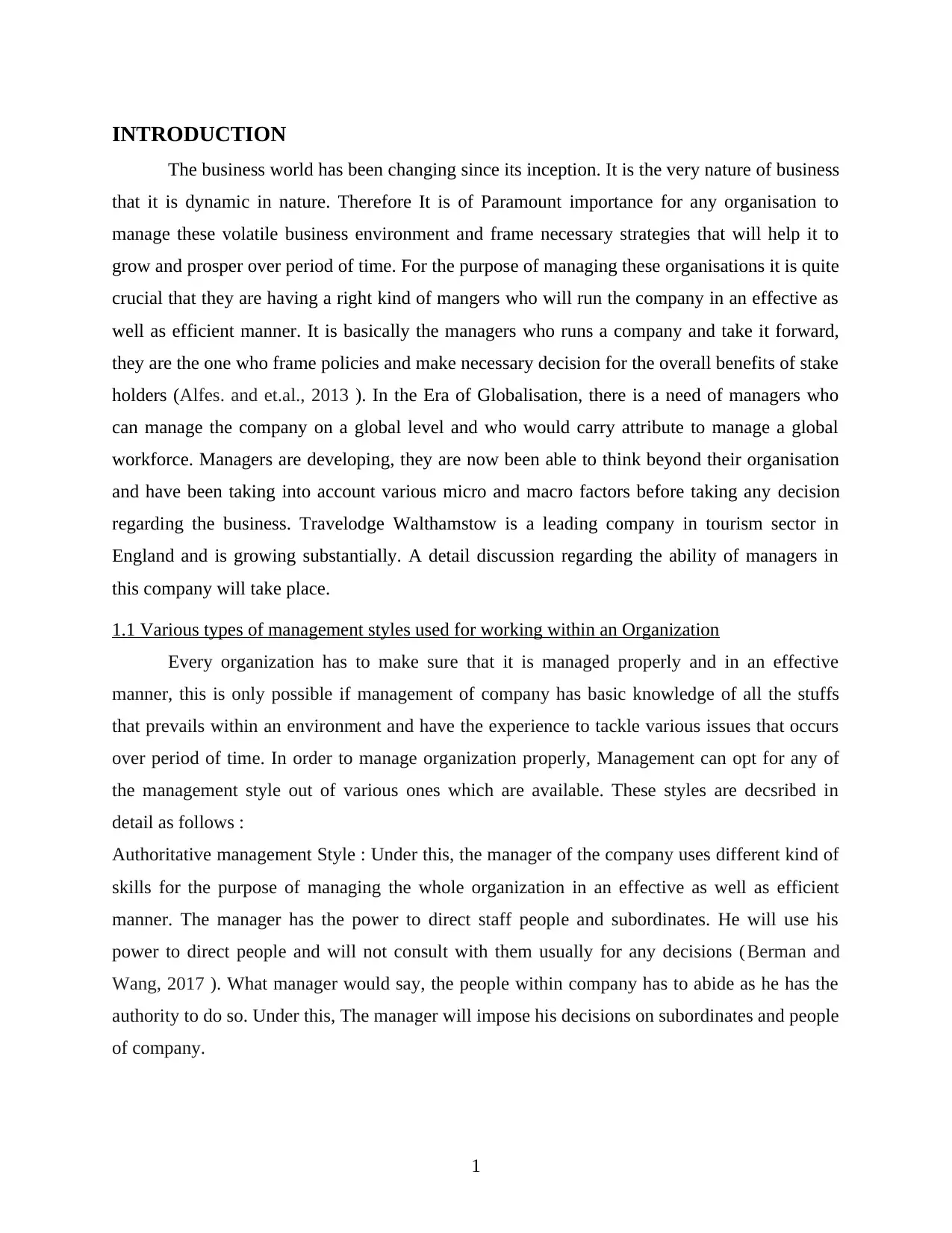
INTRODUCTION
The business world has been changing since its inception. It is the very nature of business
that it is dynamic in nature. Therefore It is of Paramount importance for any organisation to
manage these volatile business environment and frame necessary strategies that will help it to
grow and prosper over period of time. For the purpose of managing these organisations it is quite
crucial that they are having a right kind of mangers who will run the company in an effective as
well as efficient manner. It is basically the managers who runs a company and take it forward,
they are the one who frame policies and make necessary decision for the overall benefits of stake
holders (Alfes. and et.al., 2013 ). In the Era of Globalisation, there is a need of managers who
can manage the company on a global level and who would carry attribute to manage a global
workforce. Managers are developing, they are now been able to think beyond their organisation
and have been taking into account various micro and macro factors before taking any decision
regarding the business. Travelodge Walthamstow is a leading company in tourism sector in
England and is growing substantially. A detail discussion regarding the ability of managers in
this company will take place.
1.1 Various types of management styles used for working within an Organization
Every organization has to make sure that it is managed properly and in an effective
manner, this is only possible if management of company has basic knowledge of all the stuffs
that prevails within an environment and have the experience to tackle various issues that occurs
over period of time. In order to manage organization properly, Management can opt for any of
the management style out of various ones which are available. These styles are decsribed in
detail as follows :
Authoritative management Style : Under this, the manager of the company uses different kind of
skills for the purpose of managing the whole organization in an effective as well as efficient
manner. The manager has the power to direct staff people and subordinates. He will use his
power to direct people and will not consult with them usually for any decisions (Berman and
Wang, 2017 ). What manager would say, the people within company has to abide as he has the
authority to do so. Under this, The manager will impose his decisions on subordinates and people
of company.
1
The business world has been changing since its inception. It is the very nature of business
that it is dynamic in nature. Therefore It is of Paramount importance for any organisation to
manage these volatile business environment and frame necessary strategies that will help it to
grow and prosper over period of time. For the purpose of managing these organisations it is quite
crucial that they are having a right kind of mangers who will run the company in an effective as
well as efficient manner. It is basically the managers who runs a company and take it forward,
they are the one who frame policies and make necessary decision for the overall benefits of stake
holders (Alfes. and et.al., 2013 ). In the Era of Globalisation, there is a need of managers who
can manage the company on a global level and who would carry attribute to manage a global
workforce. Managers are developing, they are now been able to think beyond their organisation
and have been taking into account various micro and macro factors before taking any decision
regarding the business. Travelodge Walthamstow is a leading company in tourism sector in
England and is growing substantially. A detail discussion regarding the ability of managers in
this company will take place.
1.1 Various types of management styles used for working within an Organization
Every organization has to make sure that it is managed properly and in an effective
manner, this is only possible if management of company has basic knowledge of all the stuffs
that prevails within an environment and have the experience to tackle various issues that occurs
over period of time. In order to manage organization properly, Management can opt for any of
the management style out of various ones which are available. These styles are decsribed in
detail as follows :
Authoritative management Style : Under this, the manager of the company uses different kind of
skills for the purpose of managing the whole organization in an effective as well as efficient
manner. The manager has the power to direct staff people and subordinates. He will use his
power to direct people and will not consult with them usually for any decisions (Berman and
Wang, 2017 ). What manager would say, the people within company has to abide as he has the
authority to do so. Under this, The manager will impose his decisions on subordinates and people
of company.
1
Paraphrase This Document
Need a fresh take? Get an instant paraphrase of this document with our AI Paraphraser
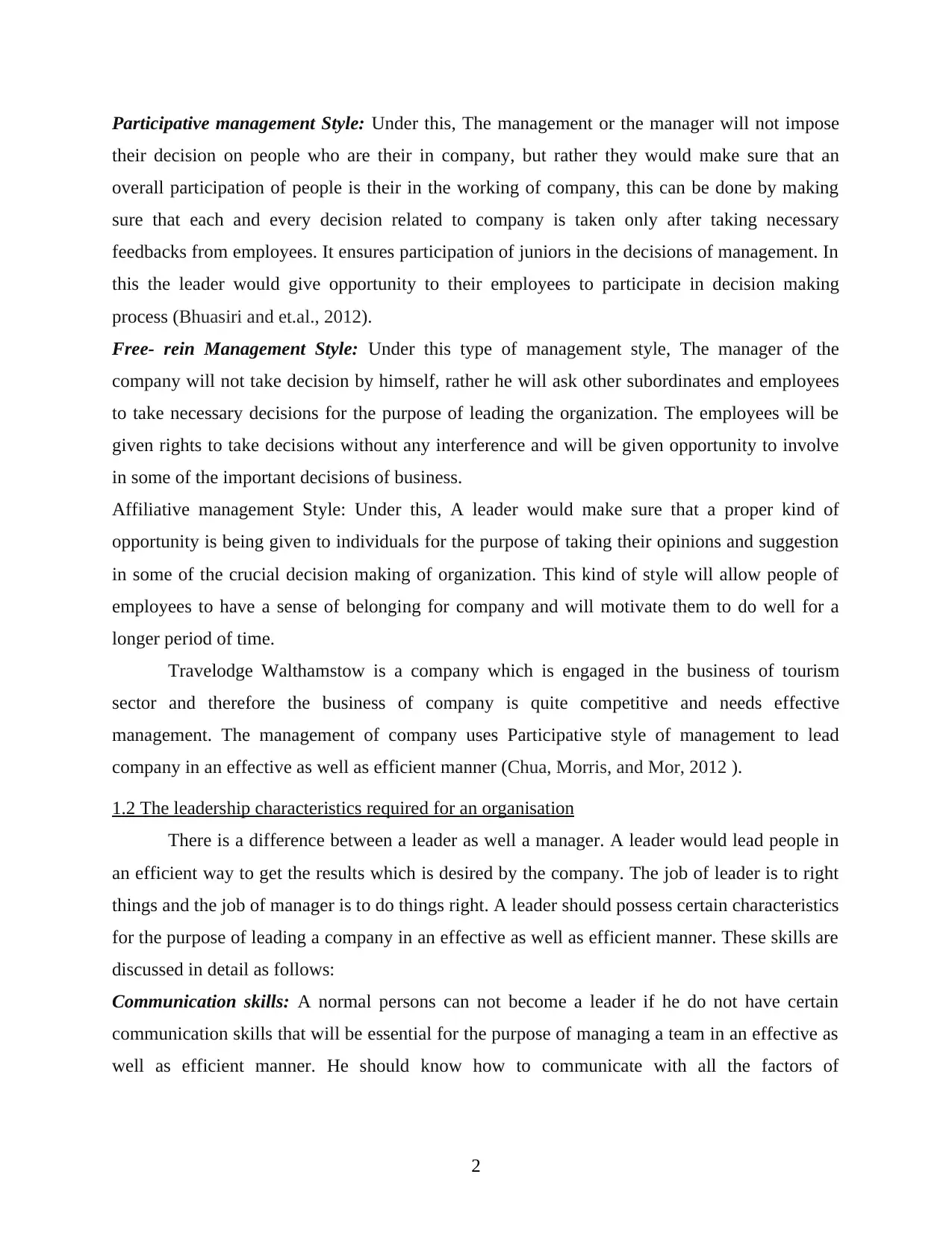
Participative management Style: Under this, The management or the manager will not impose
their decision on people who are their in company, but rather they would make sure that an
overall participation of people is their in the working of company, this can be done by making
sure that each and every decision related to company is taken only after taking necessary
feedbacks from employees. It ensures participation of juniors in the decisions of management. In
this the leader would give opportunity to their employees to participate in decision making
process (Bhuasiri and et.al., 2012).
Free- rein Management Style: Under this type of management style, The manager of the
company will not take decision by himself, rather he will ask other subordinates and employees
to take necessary decisions for the purpose of leading the organization. The employees will be
given rights to take decisions without any interference and will be given opportunity to involve
in some of the important decisions of business.
Affiliative management Style: Under this, A leader would make sure that a proper kind of
opportunity is being given to individuals for the purpose of taking their opinions and suggestion
in some of the crucial decision making of organization. This kind of style will allow people of
employees to have a sense of belonging for company and will motivate them to do well for a
longer period of time.
Travelodge Walthamstow is a company which is engaged in the business of tourism
sector and therefore the business of company is quite competitive and needs effective
management. The management of company uses Participative style of management to lead
company in an effective as well as efficient manner (Chua, Morris, and Mor, 2012 ).
1.2 The leadership characteristics required for an organisation
There is a difference between a leader as well a manager. A leader would lead people in
an efficient way to get the results which is desired by the company. The job of leader is to right
things and the job of manager is to do things right. A leader should possess certain characteristics
for the purpose of leading a company in an effective as well as efficient manner. These skills are
discussed in detail as follows:
Communication skills: A normal persons can not become a leader if he do not have certain
communication skills that will be essential for the purpose of managing a team in an effective as
well as efficient manner. He should know how to communicate with all the factors of
2
their decision on people who are their in company, but rather they would make sure that an
overall participation of people is their in the working of company, this can be done by making
sure that each and every decision related to company is taken only after taking necessary
feedbacks from employees. It ensures participation of juniors in the decisions of management. In
this the leader would give opportunity to their employees to participate in decision making
process (Bhuasiri and et.al., 2012).
Free- rein Management Style: Under this type of management style, The manager of the
company will not take decision by himself, rather he will ask other subordinates and employees
to take necessary decisions for the purpose of leading the organization. The employees will be
given rights to take decisions without any interference and will be given opportunity to involve
in some of the important decisions of business.
Affiliative management Style: Under this, A leader would make sure that a proper kind of
opportunity is being given to individuals for the purpose of taking their opinions and suggestion
in some of the crucial decision making of organization. This kind of style will allow people of
employees to have a sense of belonging for company and will motivate them to do well for a
longer period of time.
Travelodge Walthamstow is a company which is engaged in the business of tourism
sector and therefore the business of company is quite competitive and needs effective
management. The management of company uses Participative style of management to lead
company in an effective as well as efficient manner (Chua, Morris, and Mor, 2012 ).
1.2 The leadership characteristics required for an organisation
There is a difference between a leader as well a manager. A leader would lead people in
an efficient way to get the results which is desired by the company. The job of leader is to right
things and the job of manager is to do things right. A leader should possess certain characteristics
for the purpose of leading a company in an effective as well as efficient manner. These skills are
discussed in detail as follows:
Communication skills: A normal persons can not become a leader if he do not have certain
communication skills that will be essential for the purpose of managing a team in an effective as
well as efficient manner. He should know how to communicate with all the factors of
2
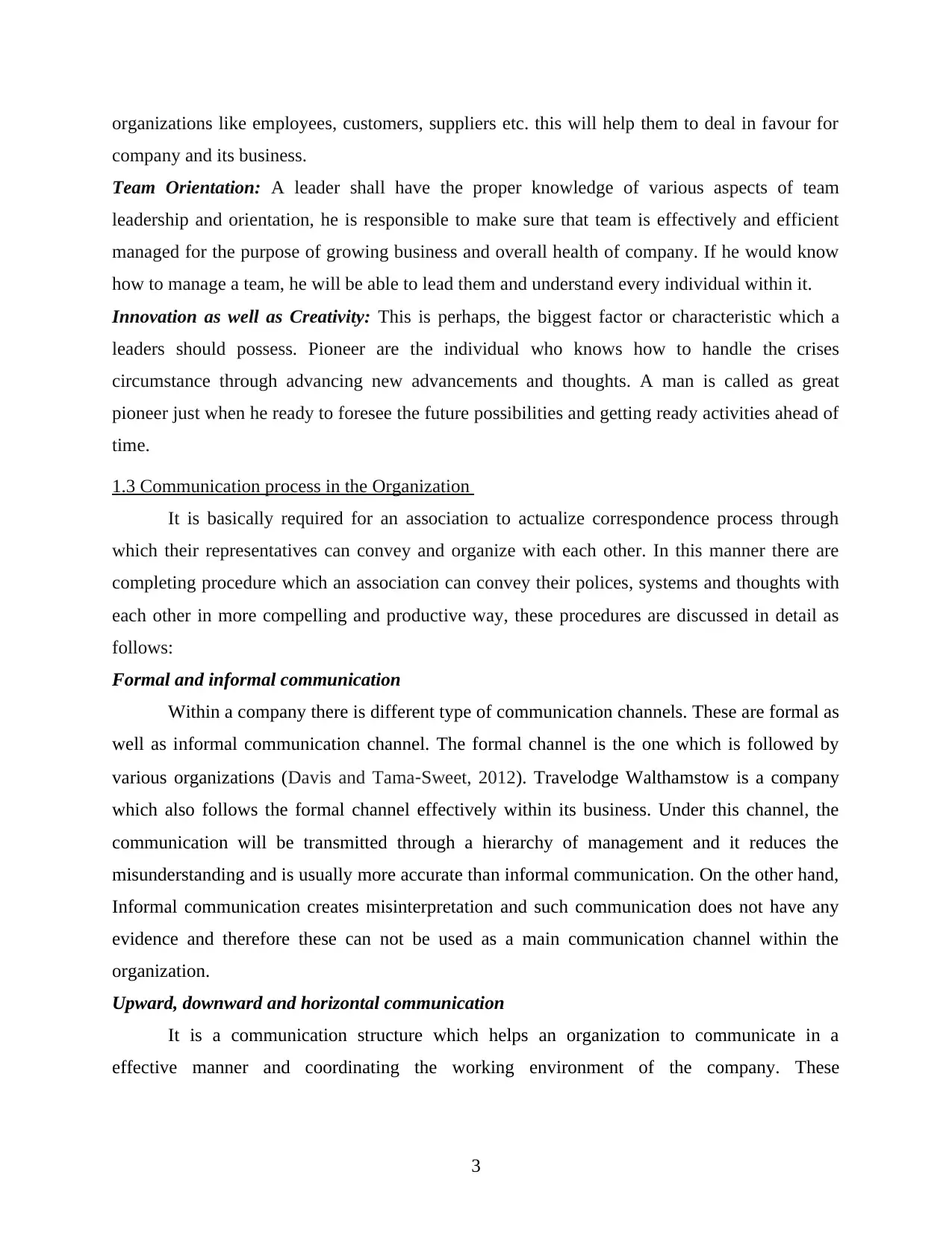
organizations like employees, customers, suppliers etc. this will help them to deal in favour for
company and its business.
Team Orientation: A leader shall have the proper knowledge of various aspects of team
leadership and orientation, he is responsible to make sure that team is effectively and efficient
managed for the purpose of growing business and overall health of company. If he would know
how to manage a team, he will be able to lead them and understand every individual within it.
Innovation as well as Creativity: This is perhaps, the biggest factor or characteristic which a
leaders should possess. Pioneer are the individual who knows how to handle the crises
circumstance through advancing new advancements and thoughts. A man is called as great
pioneer just when he ready to foresee the future possibilities and getting ready activities ahead of
time.
1.3 Communication process in the Organization
It is basically required for an association to actualize correspondence process through
which their representatives can convey and organize with each other. In this manner there are
completing procedure which an association can convey their polices, systems and thoughts with
each other in more compelling and productive way, these procedures are discussed in detail as
follows:
Formal and informal communication
Within a company there is different type of communication channels. These are formal as
well as informal communication channel. The formal channel is the one which is followed by
various organizations (Davis and Tama‐Sweet, 2012). Travelodge Walthamstow is a company
which also follows the formal channel effectively within its business. Under this channel, the
communication will be transmitted through a hierarchy of management and it reduces the
misunderstanding and is usually more accurate than informal communication. On the other hand,
Informal communication creates misinterpretation and such communication does not have any
evidence and therefore these can not be used as a main communication channel within the
organization.
Upward, downward and horizontal communication
It is a communication structure which helps an organization to communicate in a
effective manner and coordinating the working environment of the company. These
3
company and its business.
Team Orientation: A leader shall have the proper knowledge of various aspects of team
leadership and orientation, he is responsible to make sure that team is effectively and efficient
managed for the purpose of growing business and overall health of company. If he would know
how to manage a team, he will be able to lead them and understand every individual within it.
Innovation as well as Creativity: This is perhaps, the biggest factor or characteristic which a
leaders should possess. Pioneer are the individual who knows how to handle the crises
circumstance through advancing new advancements and thoughts. A man is called as great
pioneer just when he ready to foresee the future possibilities and getting ready activities ahead of
time.
1.3 Communication process in the Organization
It is basically required for an association to actualize correspondence process through
which their representatives can convey and organize with each other. In this manner there are
completing procedure which an association can convey their polices, systems and thoughts with
each other in more compelling and productive way, these procedures are discussed in detail as
follows:
Formal and informal communication
Within a company there is different type of communication channels. These are formal as
well as informal communication channel. The formal channel is the one which is followed by
various organizations (Davis and Tama‐Sweet, 2012). Travelodge Walthamstow is a company
which also follows the formal channel effectively within its business. Under this channel, the
communication will be transmitted through a hierarchy of management and it reduces the
misunderstanding and is usually more accurate than informal communication. On the other hand,
Informal communication creates misinterpretation and such communication does not have any
evidence and therefore these can not be used as a main communication channel within the
organization.
Upward, downward and horizontal communication
It is a communication structure which helps an organization to communicate in a
effective manner and coordinating the working environment of the company. These
3
⊘ This is a preview!⊘
Do you want full access?
Subscribe today to unlock all pages.

Trusted by 1+ million students worldwide
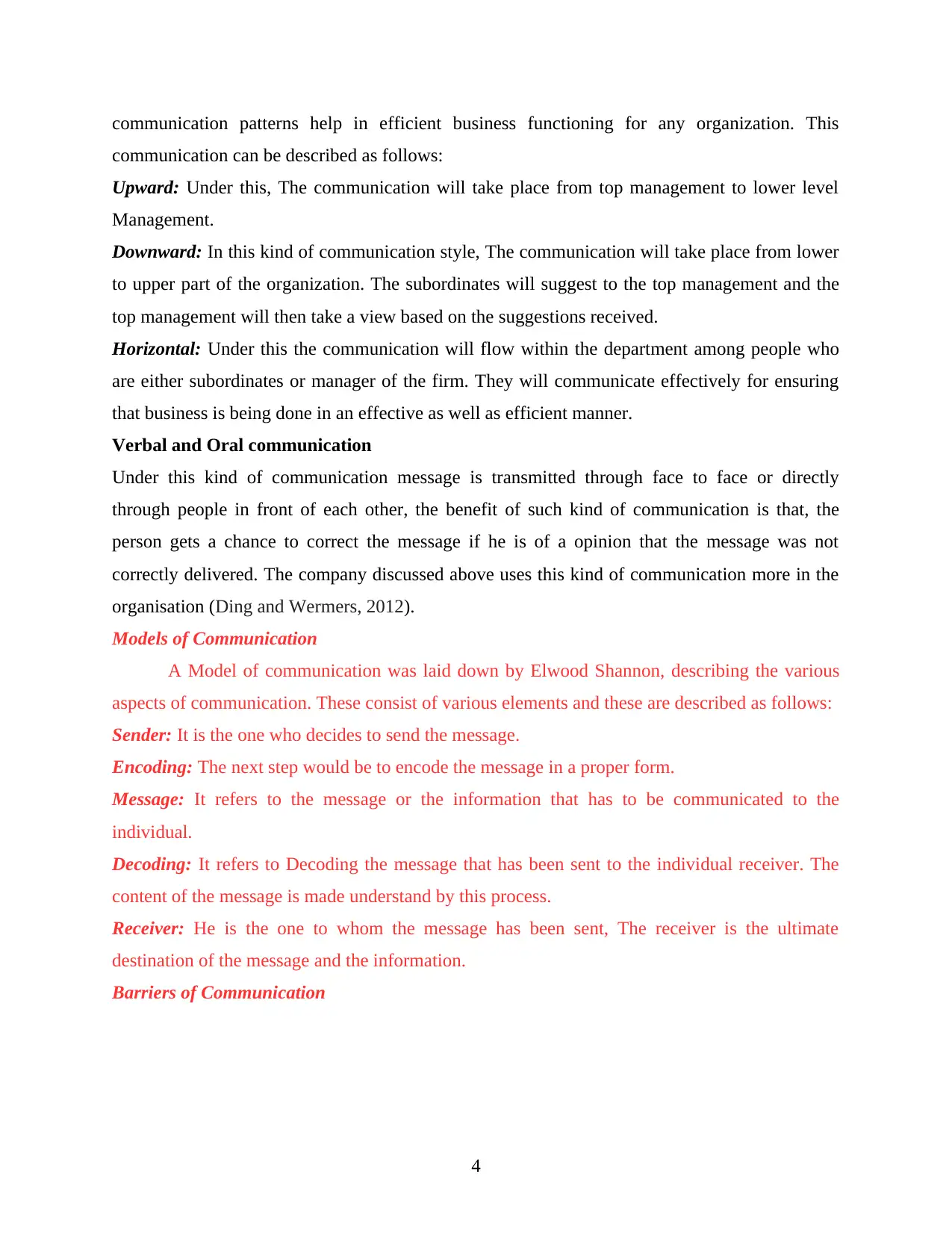
communication patterns help in efficient business functioning for any organization. This
communication can be described as follows:
Upward: Under this, The communication will take place from top management to lower level
Management.
Downward: In this kind of communication style, The communication will take place from lower
to upper part of the organization. The subordinates will suggest to the top management and the
top management will then take a view based on the suggestions received.
Horizontal: Under this the communication will flow within the department among people who
are either subordinates or manager of the firm. They will communicate effectively for ensuring
that business is being done in an effective as well as efficient manner.
Verbal and Oral communication
Under this kind of communication message is transmitted through face to face or directly
through people in front of each other, the benefit of such kind of communication is that, the
person gets a chance to correct the message if he is of a opinion that the message was not
correctly delivered. The company discussed above uses this kind of communication more in the
organisation (Ding and Wermers, 2012).
Models of Communication
A Model of communication was laid down by Elwood Shannon, describing the various
aspects of communication. These consist of various elements and these are described as follows:
Sender: It is the one who decides to send the message.
Encoding: The next step would be to encode the message in a proper form.
Message: It refers to the message or the information that has to be communicated to the
individual.
Decoding: It refers to Decoding the message that has been sent to the individual receiver. The
content of the message is made understand by this process.
Receiver: He is the one to whom the message has been sent, The receiver is the ultimate
destination of the message and the information.
Barriers of Communication
4
communication can be described as follows:
Upward: Under this, The communication will take place from top management to lower level
Management.
Downward: In this kind of communication style, The communication will take place from lower
to upper part of the organization. The subordinates will suggest to the top management and the
top management will then take a view based on the suggestions received.
Horizontal: Under this the communication will flow within the department among people who
are either subordinates or manager of the firm. They will communicate effectively for ensuring
that business is being done in an effective as well as efficient manner.
Verbal and Oral communication
Under this kind of communication message is transmitted through face to face or directly
through people in front of each other, the benefit of such kind of communication is that, the
person gets a chance to correct the message if he is of a opinion that the message was not
correctly delivered. The company discussed above uses this kind of communication more in the
organisation (Ding and Wermers, 2012).
Models of Communication
A Model of communication was laid down by Elwood Shannon, describing the various
aspects of communication. These consist of various elements and these are described as follows:
Sender: It is the one who decides to send the message.
Encoding: The next step would be to encode the message in a proper form.
Message: It refers to the message or the information that has to be communicated to the
individual.
Decoding: It refers to Decoding the message that has been sent to the individual receiver. The
content of the message is made understand by this process.
Receiver: He is the one to whom the message has been sent, The receiver is the ultimate
destination of the message and the information.
Barriers of Communication
4
Paraphrase This Document
Need a fresh take? Get an instant paraphrase of this document with our AI Paraphraser
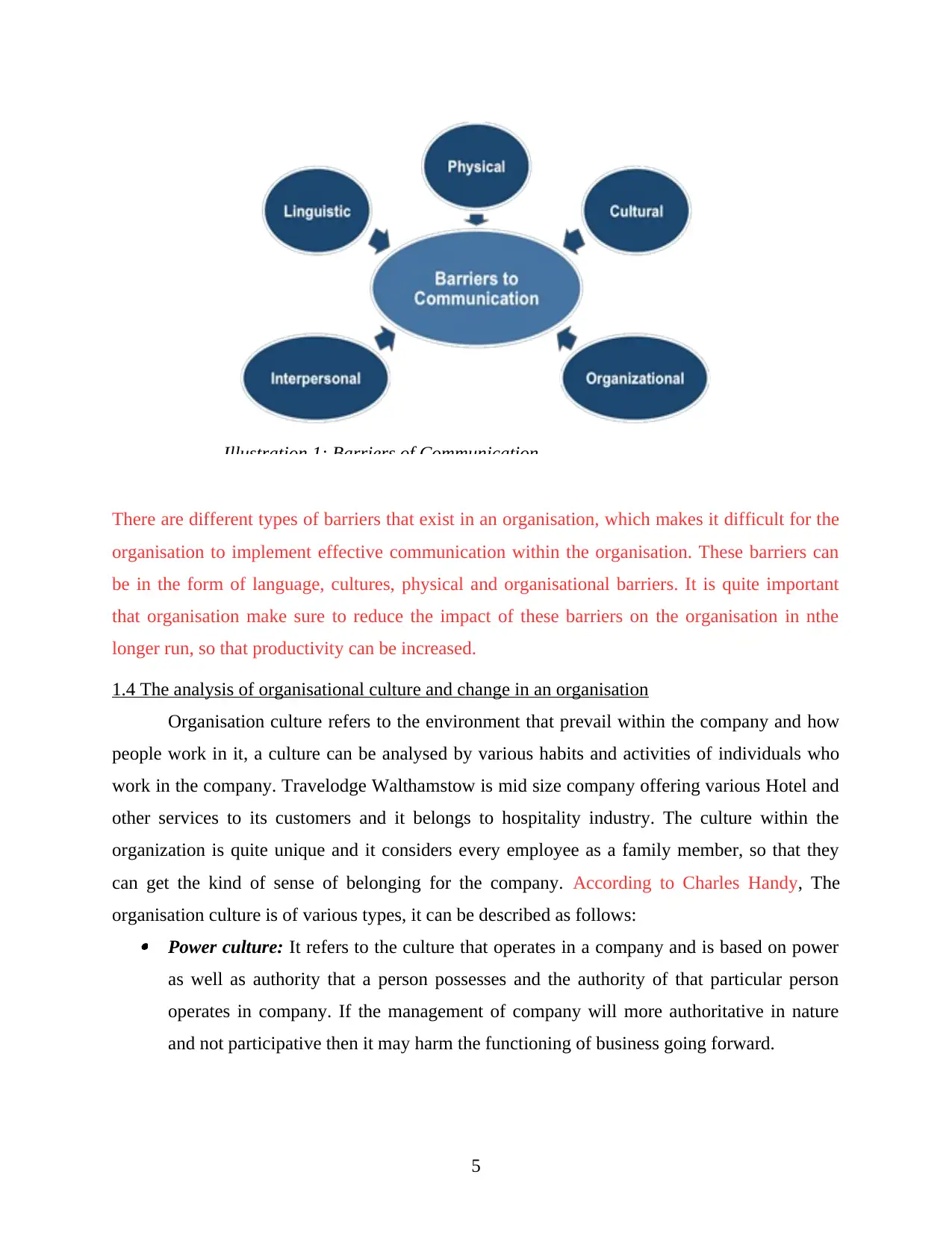
m
There are different types of barriers that exist in an organisation, which makes it difficult for the
organisation to implement effective communication within the organisation. These barriers can
be in the form of language, cultures, physical and organisational barriers. It is quite important
that organisation make sure to reduce the impact of these barriers on the organisation in nthe
longer run, so that productivity can be increased.
1.4 The analysis of organisational culture and change in an organisation
Organisation culture refers to the environment that prevail within the company and how
people work in it, a culture can be analysed by various habits and activities of individuals who
work in the company. Travelodge Walthamstow is mid size company offering various Hotel and
other services to its customers and it belongs to hospitality industry. The culture within the
organization is quite unique and it considers every employee as a family member, so that they
can get the kind of sense of belonging for the company. According to Charles Handy, The
organisation culture is of various types, it can be described as follows: Power culture: It refers to the culture that operates in a company and is based on power
as well as authority that a person possesses and the authority of that particular person
operates in company. If the management of company will more authoritative in nature
and not participative then it may harm the functioning of business going forward.
5
Illustration 1: Barriers of Communication
There are different types of barriers that exist in an organisation, which makes it difficult for the
organisation to implement effective communication within the organisation. These barriers can
be in the form of language, cultures, physical and organisational barriers. It is quite important
that organisation make sure to reduce the impact of these barriers on the organisation in nthe
longer run, so that productivity can be increased.
1.4 The analysis of organisational culture and change in an organisation
Organisation culture refers to the environment that prevail within the company and how
people work in it, a culture can be analysed by various habits and activities of individuals who
work in the company. Travelodge Walthamstow is mid size company offering various Hotel and
other services to its customers and it belongs to hospitality industry. The culture within the
organization is quite unique and it considers every employee as a family member, so that they
can get the kind of sense of belonging for the company. According to Charles Handy, The
organisation culture is of various types, it can be described as follows: Power culture: It refers to the culture that operates in a company and is based on power
as well as authority that a person possesses and the authority of that particular person
operates in company. If the management of company will more authoritative in nature
and not participative then it may harm the functioning of business going forward.
5
Illustration 1: Barriers of Communication
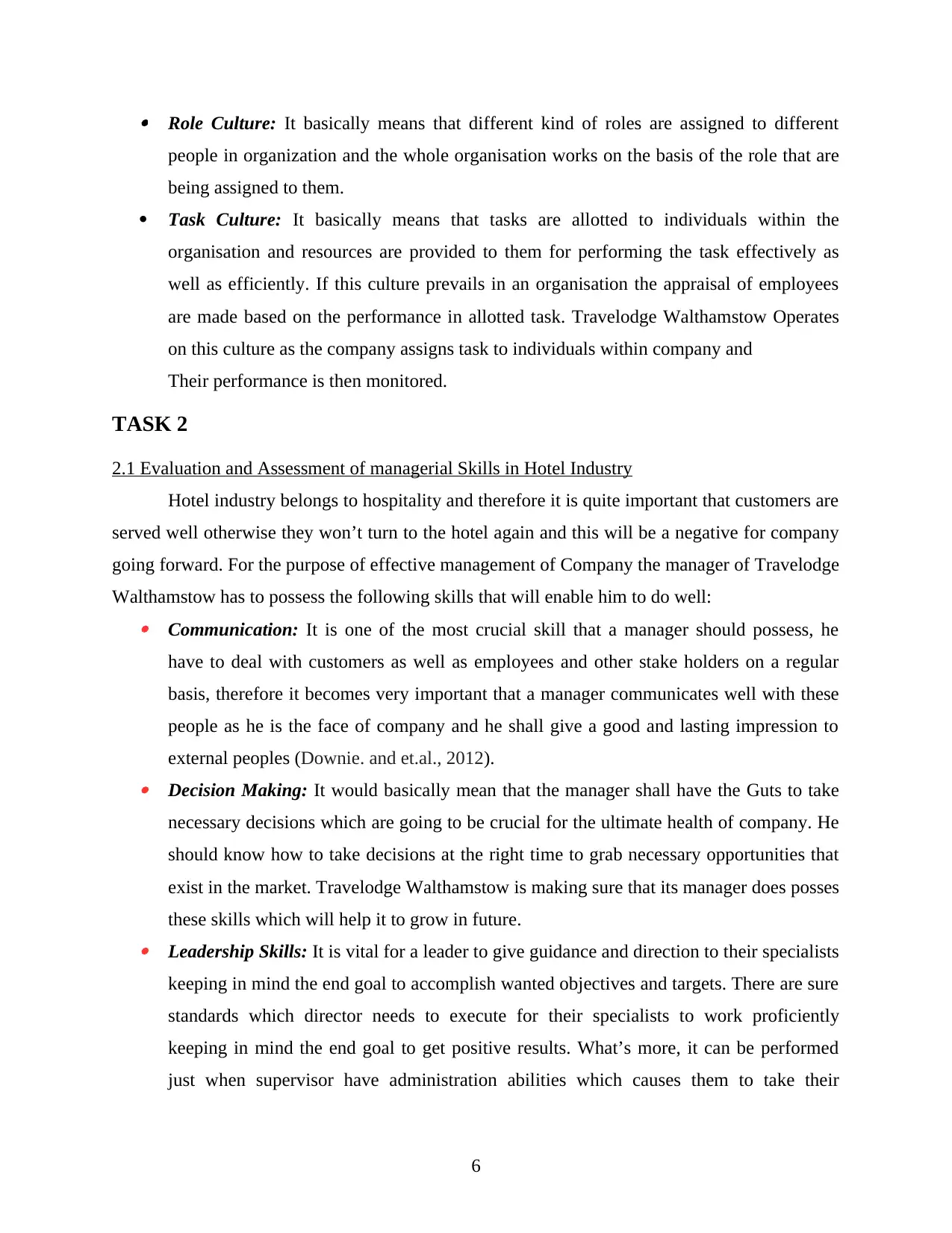
Role Culture: It basically means that different kind of roles are assigned to different
people in organization and the whole organisation works on the basis of the role that are
being assigned to them.
Task Culture: It basically means that tasks are allotted to individuals within the
organisation and resources are provided to them for performing the task effectively as
well as efficiently. If this culture prevails in an organisation the appraisal of employees
are made based on the performance in allotted task. Travelodge Walthamstow Operates
on this culture as the company assigns task to individuals within company and
Their performance is then monitored.
TASK 2
2.1 Evaluation and Assessment of managerial Skills in Hotel Industry
Hotel industry belongs to hospitality and therefore it is quite important that customers are
served well otherwise they won’t turn to the hotel again and this will be a negative for company
going forward. For the purpose of effective management of Company the manager of Travelodge
Walthamstow has to possess the following skills that will enable him to do well: Communication: It is one of the most crucial skill that a manager should possess, he
have to deal with customers as well as employees and other stake holders on a regular
basis, therefore it becomes very important that a manager communicates well with these
people as he is the face of company and he shall give a good and lasting impression to
external peoples (Downie. and et.al., 2012). Decision Making: It would basically mean that the manager shall have the Guts to take
necessary decisions which are going to be crucial for the ultimate health of company. He
should know how to take decisions at the right time to grab necessary opportunities that
exist in the market. Travelodge Walthamstow is making sure that its manager does posses
these skills which will help it to grow in future. Leadership Skills: It is vital for a leader to give guidance and direction to their specialists
keeping in mind the end goal to accomplish wanted objectives and targets. There are sure
standards which director needs to execute for their specialists to work proficiently
keeping in mind the end goal to get positive results. What’s more, it can be performed
just when supervisor have administration abilities which causes them to take their
6
people in organization and the whole organisation works on the basis of the role that are
being assigned to them.
Task Culture: It basically means that tasks are allotted to individuals within the
organisation and resources are provided to them for performing the task effectively as
well as efficiently. If this culture prevails in an organisation the appraisal of employees
are made based on the performance in allotted task. Travelodge Walthamstow Operates
on this culture as the company assigns task to individuals within company and
Their performance is then monitored.
TASK 2
2.1 Evaluation and Assessment of managerial Skills in Hotel Industry
Hotel industry belongs to hospitality and therefore it is quite important that customers are
served well otherwise they won’t turn to the hotel again and this will be a negative for company
going forward. For the purpose of effective management of Company the manager of Travelodge
Walthamstow has to possess the following skills that will enable him to do well: Communication: It is one of the most crucial skill that a manager should possess, he
have to deal with customers as well as employees and other stake holders on a regular
basis, therefore it becomes very important that a manager communicates well with these
people as he is the face of company and he shall give a good and lasting impression to
external peoples (Downie. and et.al., 2012). Decision Making: It would basically mean that the manager shall have the Guts to take
necessary decisions which are going to be crucial for the ultimate health of company. He
should know how to take decisions at the right time to grab necessary opportunities that
exist in the market. Travelodge Walthamstow is making sure that its manager does posses
these skills which will help it to grow in future. Leadership Skills: It is vital for a leader to give guidance and direction to their specialists
keeping in mind the end goal to accomplish wanted objectives and targets. There are sure
standards which director needs to execute for their specialists to work proficiently
keeping in mind the end goal to get positive results. What’s more, it can be performed
just when supervisor have administration abilities which causes them to take their
6
⊘ This is a preview!⊘
Do you want full access?
Subscribe today to unlock all pages.

Trusted by 1+ million students worldwide
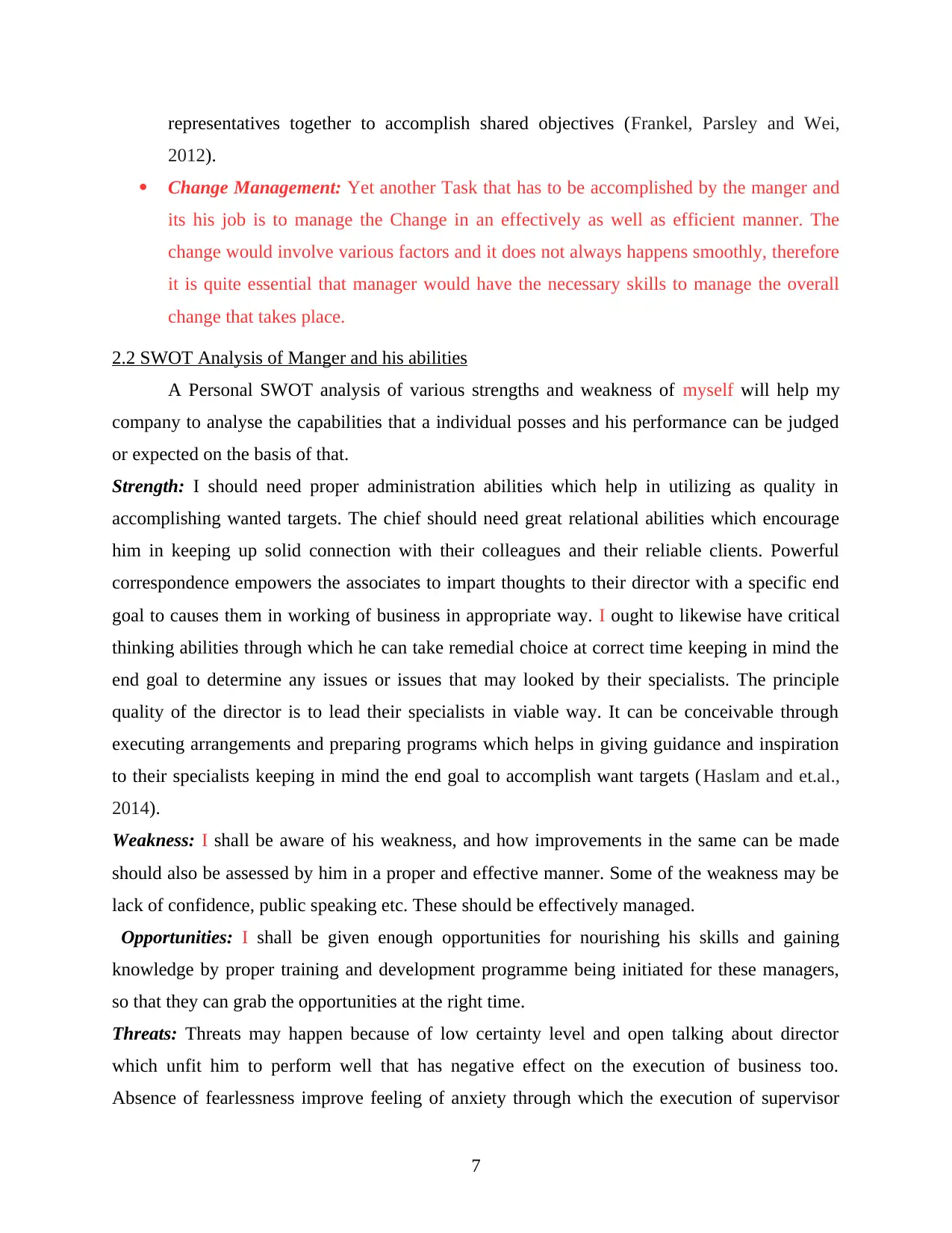
representatives together to accomplish shared objectives (Frankel, Parsley and Wei,
2012).
Change Management: Yet another Task that has to be accomplished by the manger and
its his job is to manage the Change in an effectively as well as efficient manner. The
change would involve various factors and it does not always happens smoothly, therefore
it is quite essential that manager would have the necessary skills to manage the overall
change that takes place.
2.2 SWOT Analysis of Manger and his abilities
A Personal SWOT analysis of various strengths and weakness of myself will help my
company to analyse the capabilities that a individual posses and his performance can be judged
or expected on the basis of that.
Strength: I should need proper administration abilities which help in utilizing as quality in
accomplishing wanted targets. The chief should need great relational abilities which encourage
him in keeping up solid connection with their colleagues and their reliable clients. Powerful
correspondence empowers the associates to impart thoughts to their director with a specific end
goal to causes them in working of business in appropriate way. I ought to likewise have critical
thinking abilities through which he can take remedial choice at correct time keeping in mind the
end goal to determine any issues or issues that may looked by their specialists. The principle
quality of the director is to lead their specialists in viable way. It can be conceivable through
executing arrangements and preparing programs which helps in giving guidance and inspiration
to their specialists keeping in mind the end goal to accomplish want targets (Haslam and et.al.,
2014).
Weakness: I shall be aware of his weakness, and how improvements in the same can be made
should also be assessed by him in a proper and effective manner. Some of the weakness may be
lack of confidence, public speaking etc. These should be effectively managed.
Opportunities: I shall be given enough opportunities for nourishing his skills and gaining
knowledge by proper training and development programme being initiated for these managers,
so that they can grab the opportunities at the right time.
Threats: Threats may happen because of low certainty level and open talking about director
which unfit him to perform well that has negative effect on the execution of business too.
Absence of fearlessness improve feeling of anxiety through which the execution of supervisor
7
2012).
Change Management: Yet another Task that has to be accomplished by the manger and
its his job is to manage the Change in an effectively as well as efficient manner. The
change would involve various factors and it does not always happens smoothly, therefore
it is quite essential that manager would have the necessary skills to manage the overall
change that takes place.
2.2 SWOT Analysis of Manger and his abilities
A Personal SWOT analysis of various strengths and weakness of myself will help my
company to analyse the capabilities that a individual posses and his performance can be judged
or expected on the basis of that.
Strength: I should need proper administration abilities which help in utilizing as quality in
accomplishing wanted targets. The chief should need great relational abilities which encourage
him in keeping up solid connection with their colleagues and their reliable clients. Powerful
correspondence empowers the associates to impart thoughts to their director with a specific end
goal to causes them in working of business in appropriate way. I ought to likewise have critical
thinking abilities through which he can take remedial choice at correct time keeping in mind the
end goal to determine any issues or issues that may looked by their specialists. The principle
quality of the director is to lead their specialists in viable way. It can be conceivable through
executing arrangements and preparing programs which helps in giving guidance and inspiration
to their specialists keeping in mind the end goal to accomplish want targets (Haslam and et.al.,
2014).
Weakness: I shall be aware of his weakness, and how improvements in the same can be made
should also be assessed by him in a proper and effective manner. Some of the weakness may be
lack of confidence, public speaking etc. These should be effectively managed.
Opportunities: I shall be given enough opportunities for nourishing his skills and gaining
knowledge by proper training and development programme being initiated for these managers,
so that they can grab the opportunities at the right time.
Threats: Threats may happen because of low certainty level and open talking about director
which unfit him to perform well that has negative effect on the execution of business too.
Absence of fearlessness improve feeling of anxiety through which the execution of supervisor
7
Paraphrase This Document
Need a fresh take? Get an instant paraphrase of this document with our AI Paraphraser
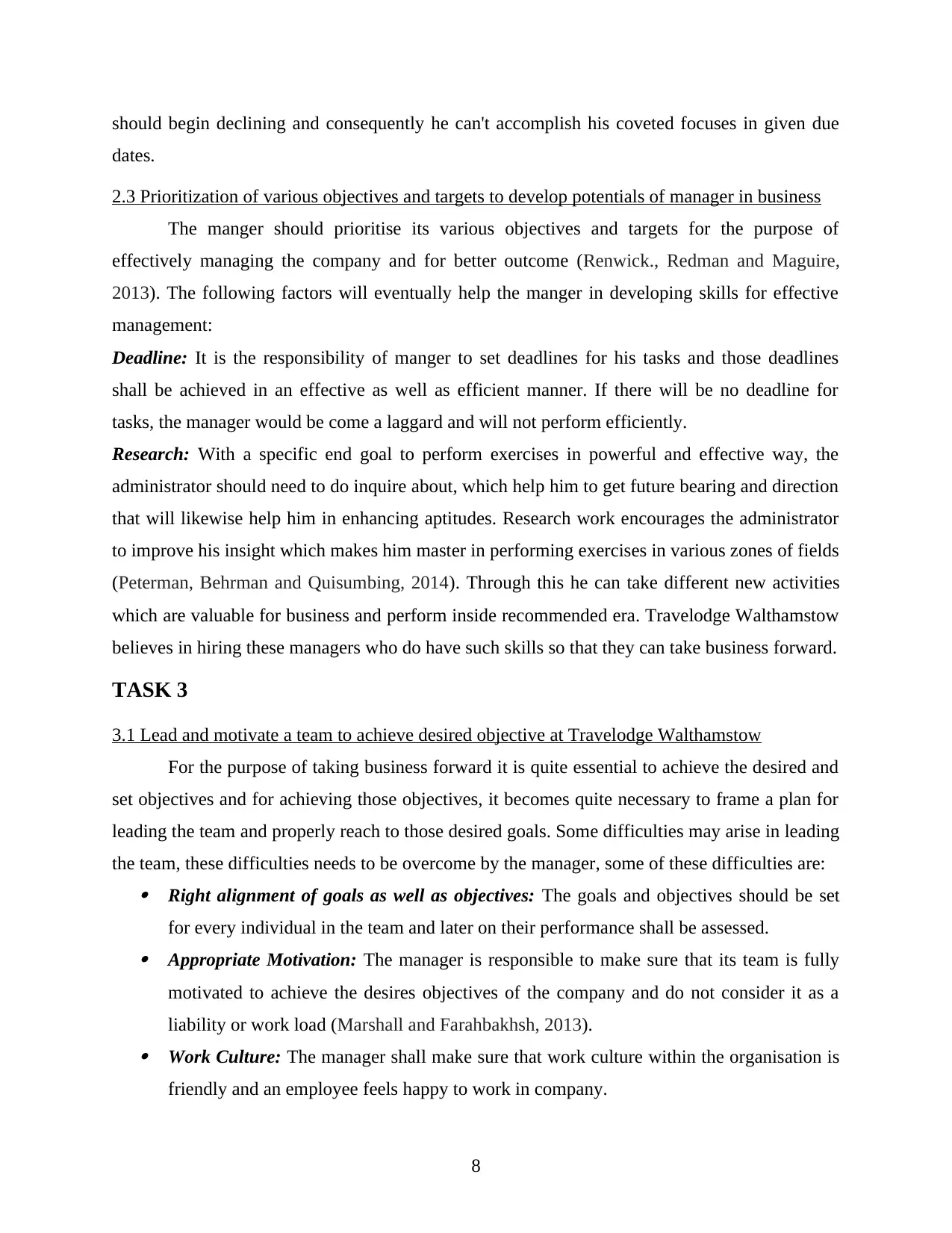
should begin declining and consequently he can't accomplish his coveted focuses in given due
dates.
2.3 Prioritization of various objectives and targets to develop potentials of manager in business
The manger should prioritise its various objectives and targets for the purpose of
effectively managing the company and for better outcome (Renwick., Redman and Maguire,
2013). The following factors will eventually help the manger in developing skills for effective
management:
Deadline: It is the responsibility of manger to set deadlines for his tasks and those deadlines
shall be achieved in an effective as well as efficient manner. If there will be no deadline for
tasks, the manager would be come a laggard and will not perform efficiently.
Research: With a specific end goal to perform exercises in powerful and effective way, the
administrator should need to do inquire about, which help him to get future bearing and direction
that will likewise help him in enhancing aptitudes. Research work encourages the administrator
to improve his insight which makes him master in performing exercises in various zones of fields
(Peterman, Behrman and Quisumbing, 2014). Through this he can take different new activities
which are valuable for business and perform inside recommended era. Travelodge Walthamstow
believes in hiring these managers who do have such skills so that they can take business forward.
TASK 3
3.1 Lead and motivate a team to achieve desired objective at Travelodge Walthamstow
For the purpose of taking business forward it is quite essential to achieve the desired and
set objectives and for achieving those objectives, it becomes quite necessary to frame a plan for
leading the team and properly reach to those desired goals. Some difficulties may arise in leading
the team, these difficulties needs to be overcome by the manager, some of these difficulties are: Right alignment of goals as well as objectives: The goals and objectives should be set
for every individual in the team and later on their performance shall be assessed. Appropriate Motivation: The manager is responsible to make sure that its team is fully
motivated to achieve the desires objectives of the company and do not consider it as a
liability or work load (Marshall and Farahbakhsh, 2013). Work Culture: The manager shall make sure that work culture within the organisation is
friendly and an employee feels happy to work in company.
8
dates.
2.3 Prioritization of various objectives and targets to develop potentials of manager in business
The manger should prioritise its various objectives and targets for the purpose of
effectively managing the company and for better outcome (Renwick., Redman and Maguire,
2013). The following factors will eventually help the manger in developing skills for effective
management:
Deadline: It is the responsibility of manger to set deadlines for his tasks and those deadlines
shall be achieved in an effective as well as efficient manner. If there will be no deadline for
tasks, the manager would be come a laggard and will not perform efficiently.
Research: With a specific end goal to perform exercises in powerful and effective way, the
administrator should need to do inquire about, which help him to get future bearing and direction
that will likewise help him in enhancing aptitudes. Research work encourages the administrator
to improve his insight which makes him master in performing exercises in various zones of fields
(Peterman, Behrman and Quisumbing, 2014). Through this he can take different new activities
which are valuable for business and perform inside recommended era. Travelodge Walthamstow
believes in hiring these managers who do have such skills so that they can take business forward.
TASK 3
3.1 Lead and motivate a team to achieve desired objective at Travelodge Walthamstow
For the purpose of taking business forward it is quite essential to achieve the desired and
set objectives and for achieving those objectives, it becomes quite necessary to frame a plan for
leading the team and properly reach to those desired goals. Some difficulties may arise in leading
the team, these difficulties needs to be overcome by the manager, some of these difficulties are: Right alignment of goals as well as objectives: The goals and objectives should be set
for every individual in the team and later on their performance shall be assessed. Appropriate Motivation: The manager is responsible to make sure that its team is fully
motivated to achieve the desires objectives of the company and do not consider it as a
liability or work load (Marshall and Farahbakhsh, 2013). Work Culture: The manager shall make sure that work culture within the organisation is
friendly and an employee feels happy to work in company.
8
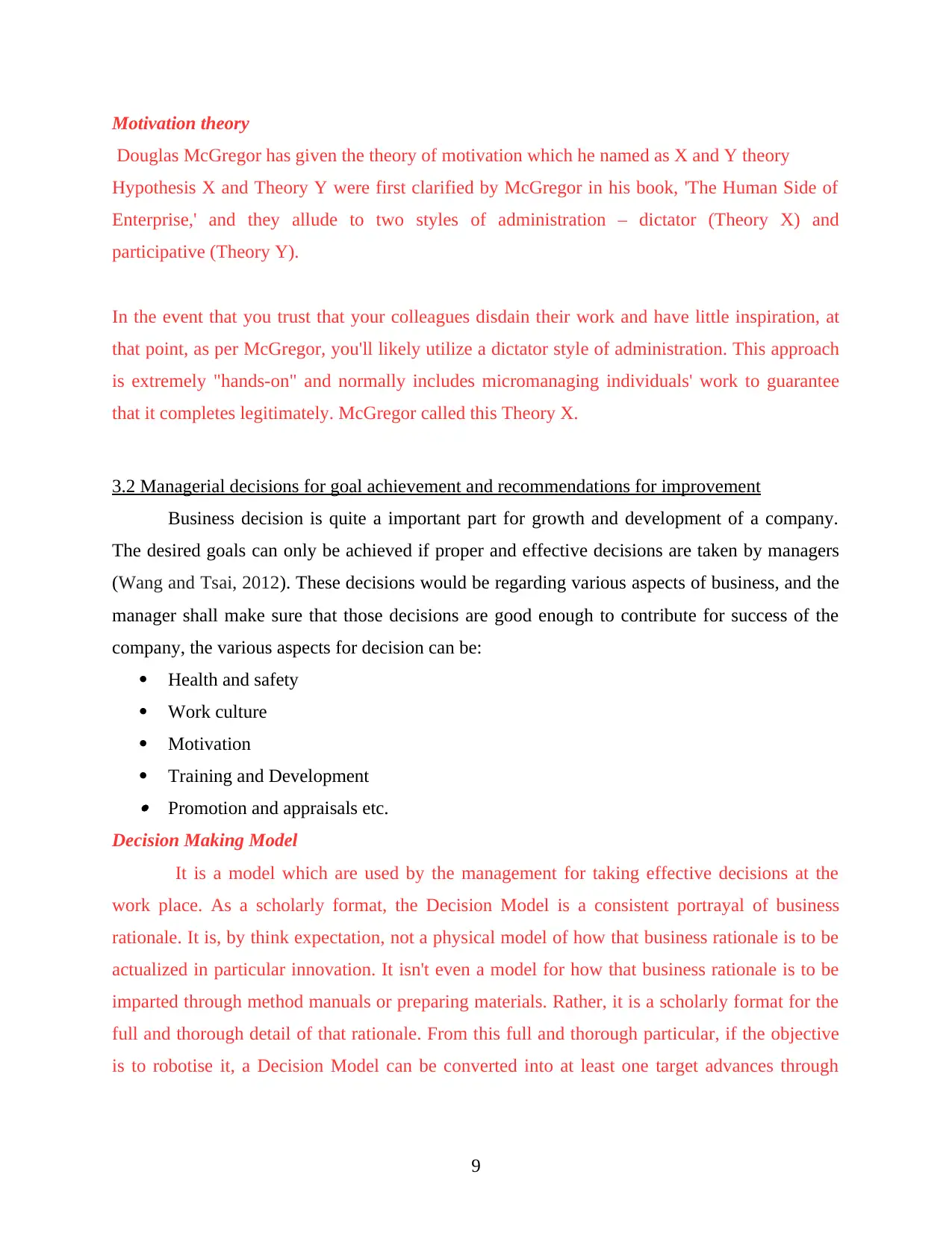
Motivation theory
Douglas McGregor has given the theory of motivation which he named as X and Y theory
Hypothesis X and Theory Y were first clarified by McGregor in his book, 'The Human Side of
Enterprise,' and they allude to two styles of administration – dictator (Theory X) and
participative (Theory Y).
In the event that you trust that your colleagues disdain their work and have little inspiration, at
that point, as per McGregor, you'll likely utilize a dictator style of administration. This approach
is extremely "hands-on" and normally includes micromanaging individuals' work to guarantee
that it completes legitimately. McGregor called this Theory X.
3.2 Managerial decisions for goal achievement and recommendations for improvement
Business decision is quite a important part for growth and development of a company.
The desired goals can only be achieved if proper and effective decisions are taken by managers
(Wang and Tsai, 2012). These decisions would be regarding various aspects of business, and the
manager shall make sure that those decisions are good enough to contribute for success of the
company, the various aspects for decision can be:
Health and safety
Work culture
Motivation
Training and Development Promotion and appraisals etc.
Decision Making Model
It is a model which are used by the management for taking effective decisions at the
work place. As a scholarly format, the Decision Model is a consistent portrayal of business
rationale. It is, by think expectation, not a physical model of how that business rationale is to be
actualized in particular innovation. It isn't even a model for how that business rationale is to be
imparted through method manuals or preparing materials. Rather, it is a scholarly format for the
full and thorough detail of that rationale. From this full and thorough particular, if the objective
is to robotise it, a Decision Model can be converted into at least one target advances through
9
Douglas McGregor has given the theory of motivation which he named as X and Y theory
Hypothesis X and Theory Y were first clarified by McGregor in his book, 'The Human Side of
Enterprise,' and they allude to two styles of administration – dictator (Theory X) and
participative (Theory Y).
In the event that you trust that your colleagues disdain their work and have little inspiration, at
that point, as per McGregor, you'll likely utilize a dictator style of administration. This approach
is extremely "hands-on" and normally includes micromanaging individuals' work to guarantee
that it completes legitimately. McGregor called this Theory X.
3.2 Managerial decisions for goal achievement and recommendations for improvement
Business decision is quite a important part for growth and development of a company.
The desired goals can only be achieved if proper and effective decisions are taken by managers
(Wang and Tsai, 2012). These decisions would be regarding various aspects of business, and the
manager shall make sure that those decisions are good enough to contribute for success of the
company, the various aspects for decision can be:
Health and safety
Work culture
Motivation
Training and Development Promotion and appraisals etc.
Decision Making Model
It is a model which are used by the management for taking effective decisions at the
work place. As a scholarly format, the Decision Model is a consistent portrayal of business
rationale. It is, by think expectation, not a physical model of how that business rationale is to be
actualized in particular innovation. It isn't even a model for how that business rationale is to be
imparted through method manuals or preparing materials. Rather, it is a scholarly format for the
full and thorough detail of that rationale. From this full and thorough particular, if the objective
is to robotise it, a Decision Model can be converted into at least one target advances through
9
⊘ This is a preview!⊘
Do you want full access?
Subscribe today to unlock all pages.

Trusted by 1+ million students worldwide
1 out of 20
Related Documents
Your All-in-One AI-Powered Toolkit for Academic Success.
+13062052269
info@desklib.com
Available 24*7 on WhatsApp / Email
![[object Object]](/_next/static/media/star-bottom.7253800d.svg)
Unlock your academic potential
Copyright © 2020–2026 A2Z Services. All Rights Reserved. Developed and managed by ZUCOL.





